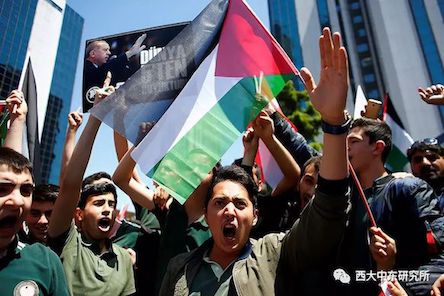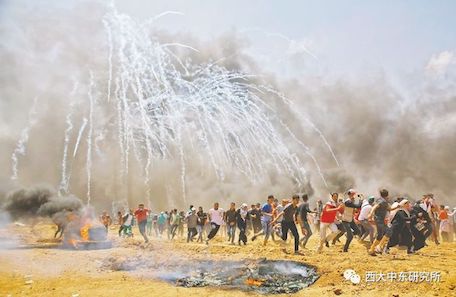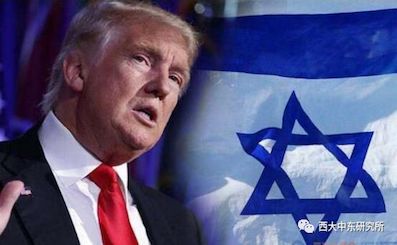近期,美国将驻以色列大使馆迁往耶路撒冷,进一步激化了巴勒斯坦和以色列之间久未弥合的伤痕。在加沙地区爆发的大规模抗议和骚乱中,50多名巴勒斯坦人被以方打死,数百人受伤,引发了中东地区和国际社会的强烈关注。当前,中东地区安全局势恶化,政治对抗加剧,在叙利亚、也门战事和伊核问题的巨大挑战之外,巴以问题又给中东地区和平与稳定的前景蒙上了新的阴影。对此局势变化,中国国际广播电台(CRI)邀请西北大学中东研究所讲师李玮博士在5月16日晚间节目中连线直播,就巴以冲突对中东局势的影响进行解读。
根据音频整理的访谈内容如下:
HOST: We’ve been following the Gaza situation these days. Now we want to focus on the reactions from major regional countries. Countries including Turkey have been strong in response to the situation. Turkey expelled its envoy to Israel. Egypt issued a warning to the Israeli act and called the US embassy move unstudied and that could “nourish the environment of instability and undermine chances for peace”. How strong is such voice in the Middle East, in the Arab World? Can they make a difference?
Dr. LI Wei: Thank you! Well, considering the voices in the Middle East regarding current issues of the US embassy move and the Israeli-Palestinian conflict in Gaza, the voices, they have been strong, emotionally, but sadly, may be only emotionally. Because so far there have been no pragmatic policy declarations or implementations to follow up their emotional voices. These kind of reactions over Palestinian problems in fact have not make any difference for decades, basically its a Nothing can be Improved in Forever Angry story. Historically, Arab countries fought over the Palestinian problems against Israel throughout the Cold War era and beyond. There have been many studies on the questions why Israel won but Arabs lost during the Middle East Wars. Despite the gap of military capabilities between the two sides, one factor actually is still valid to today’s Palestinian issue. That is to say, division of Muslim world, the concern of self-interests of each Arab countries related to the problem, and more critically, the fighting over to leadership of Arab world, or even Muslim world over the Palestinian issue. You see, condemnation has been always valid and strong in Muslim countries in the region, but none of those countries has solutions, agenda than strong condemnation. So, we have been experience no difference upon the condemning voices for a long time, that is not new.

HOST: What about those who are less vocal? Like Saudi Arabia, it strongly condemned the killings and also called for the cessation of violence between Palestinians and Israelis. I guess Saudi needs Israel and of course the US behind to deal with Iran. So how do we make sense of the stance of Saudi and some other countries in the region that are facing the similar dilemma? What would be their considerations?
Dr. LI Wei: It is very interesting to observe and review the stance of Saudi Arabia over the issues. As I mentioned previously, regional countries have to show their stance with political and religious correctness over the Palestinian problems on one hand, but more importantly, to think about their self-interest in the region on the other hand. Currently, the most crucial strategic challenge to Saudi Arabia is of course, as everybody knows, Iran. Generally, the grand context of contemporary chaos in the middle east is the Sunni-Shiite conflict, the question of who can be the leader of the region and the Muslim world. Although the reality would be more complex than a simple answer of Sunni-Shiite conflict, but this is the major rationale to explain the current political stance and behavior of Saudi Arabia in many regional issues, including the war in Yemen, Syria, and of course, the Palestinian tragedy in Gaza.

HOST: Let’s touch on some other questions. First on the protests, how much do you think the ongoing anger has something to do with the US embassy move and how much is it related to the hardship of people living in Gaza?How important is it to address the Gaza livelihoods issue regarding the Israeli-Palestinian peace process? What could be the way out?
Dr. LI Wei: Thank you! Yes it is interesting to think about how much this Gaza protests related to the US embassy move, or, if we can change to another way to ask, would there be no conflict in Gaza if US did not decide to move its embassy to Jerusalem? I think the answer would be obvious if we examine the short history of the Gaza Stripe after Israel retreat from the place. There have been three major military operations against Gaze since then, the Operation Cast Lead in 2009, the Operation Pillar of Defense in 2012, and the Operation Protective Edge in 2014. I was in Israel during the military operation against Gaza in 2014, and the observation lead me to a conclusion that Israel is taking an asymmetric coexistence with Gaza, materially, institutionally and culturally, creating a situation of imbalanced coexistence. It’s like breathing for peace in swimming.

HOST: We’ve been trying to figure out the rationale behind the US Trump administration in doing so. What’s your evaluation of its Middle East policy now? What’s it trying to achieve?
Dr. LI Wei: Thank you! Yes it is very important to review what Mr. Trump’s middle east policy has been done so far, it is may be the most important factor to be evaluated in today’s middle east chaotic matrix. It is interesting to remind me one year ago when we discuss about Mr. Trump’s middle east policy seeing his advisers came and left from the white house, by that time no body can get a clue on it. But today, he boldly opened three parallel fronts in the region, as you mentioned, Syria, Iran and Palestine. In fact, each of these three issues is big and very very little chance to get those problems be improved or resolved, respectively. Each of those problems would be a great challenge to leaders of outside powers, lets say, Obama or Mr. Trump. But, putting all unsolvable problems together may not be a bad idea, since these issues in fact are closely interrelated. I would say Mr. Trump’s Middle East Policy is crazy but creative, like gambling. Mr. Trump is showing his hand, he hopes to get a total victory and solve all problems once for all. But we should wait and see the risk result in coming developments, thank you!